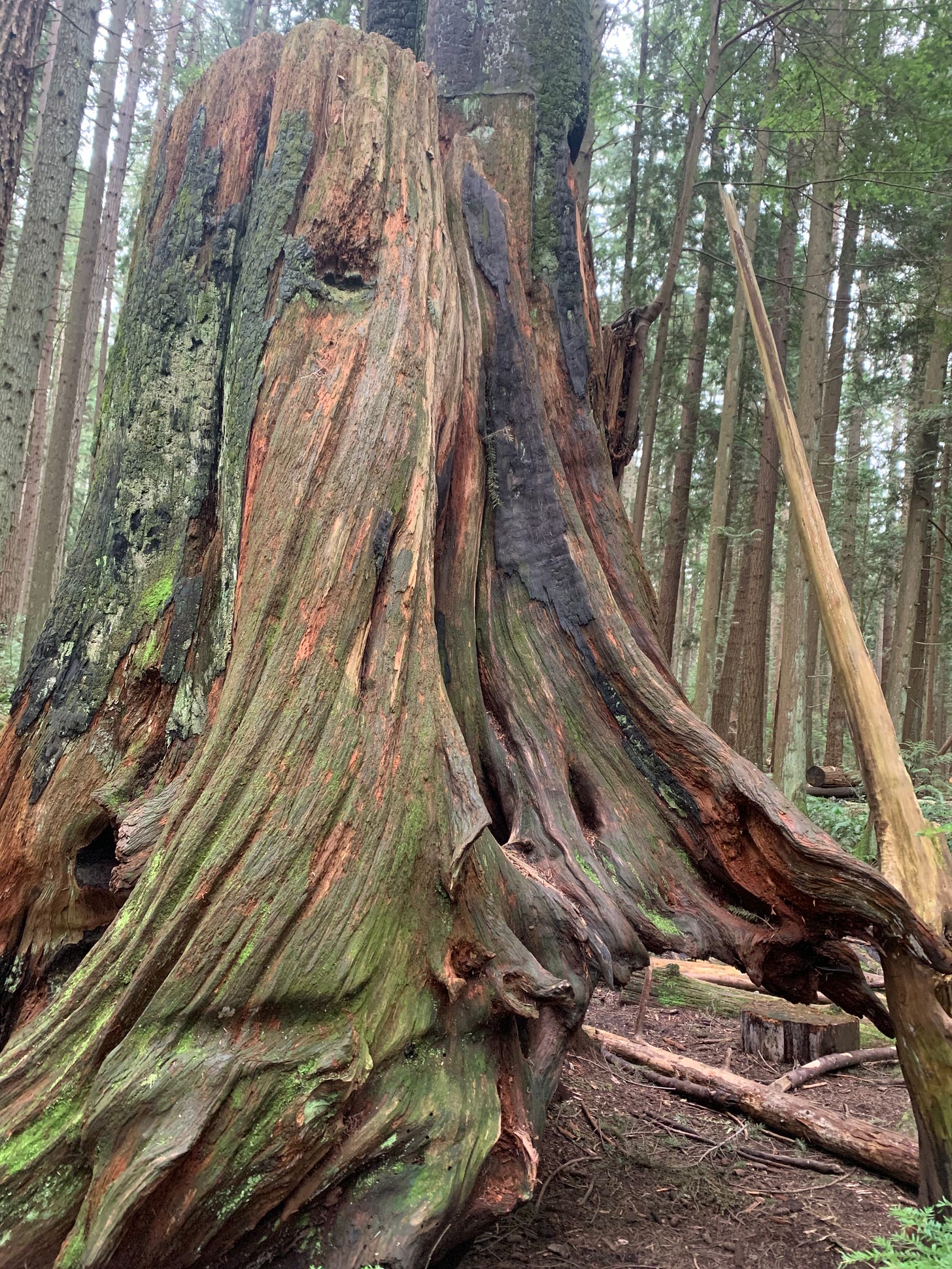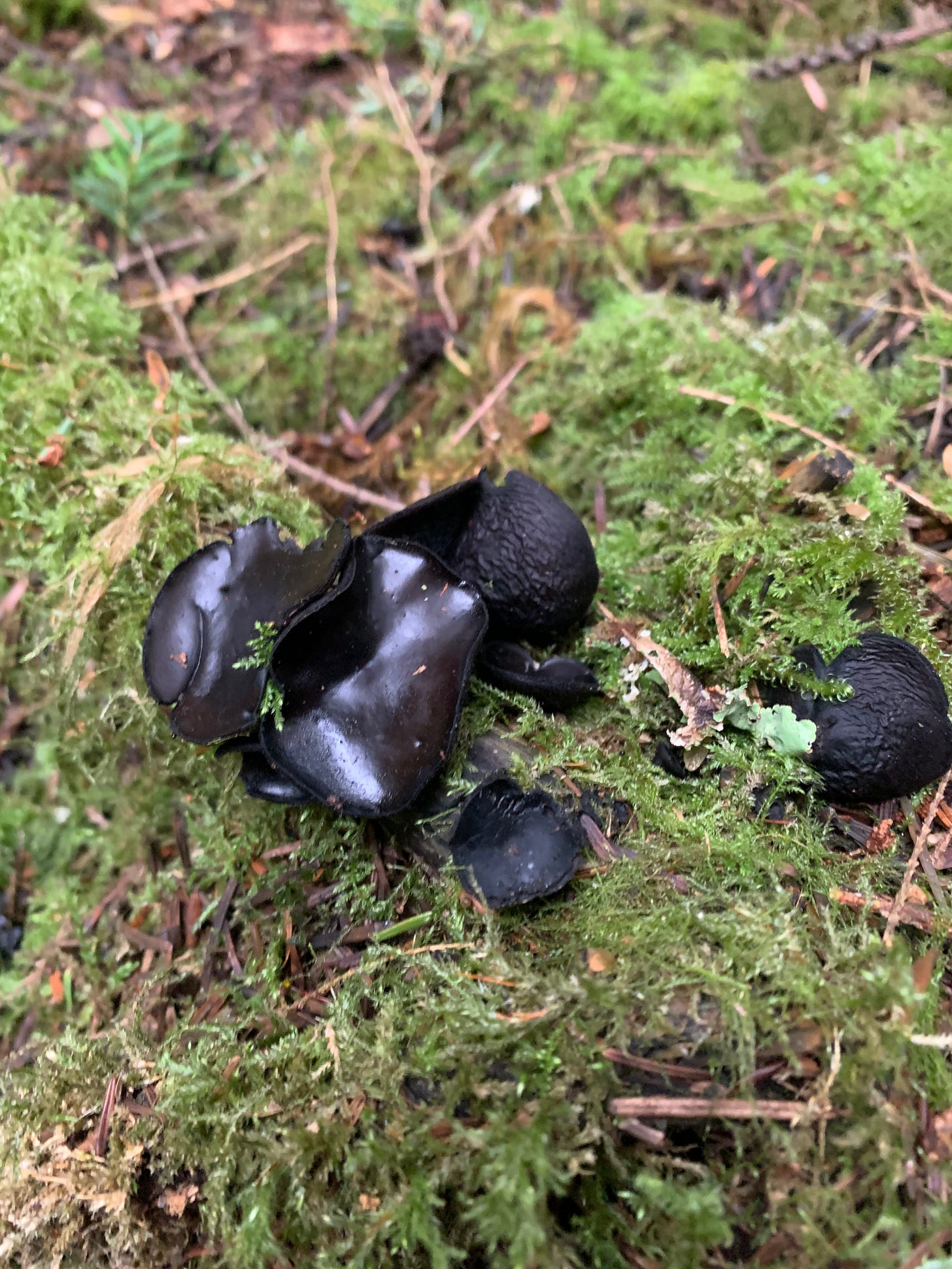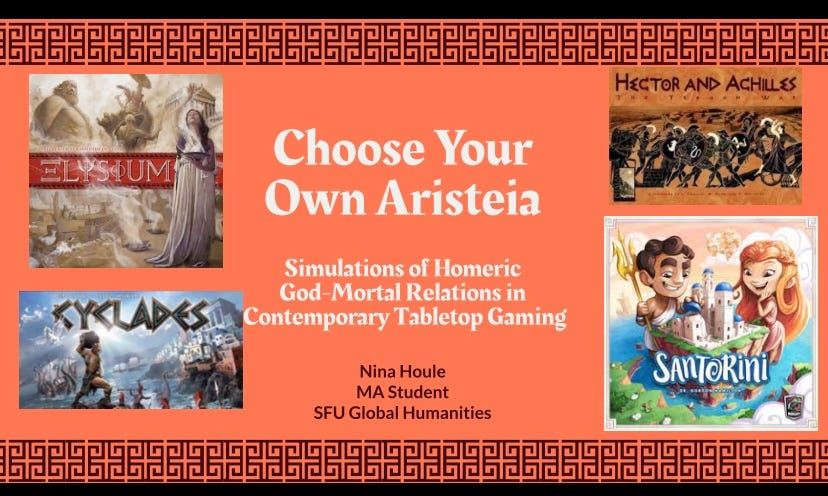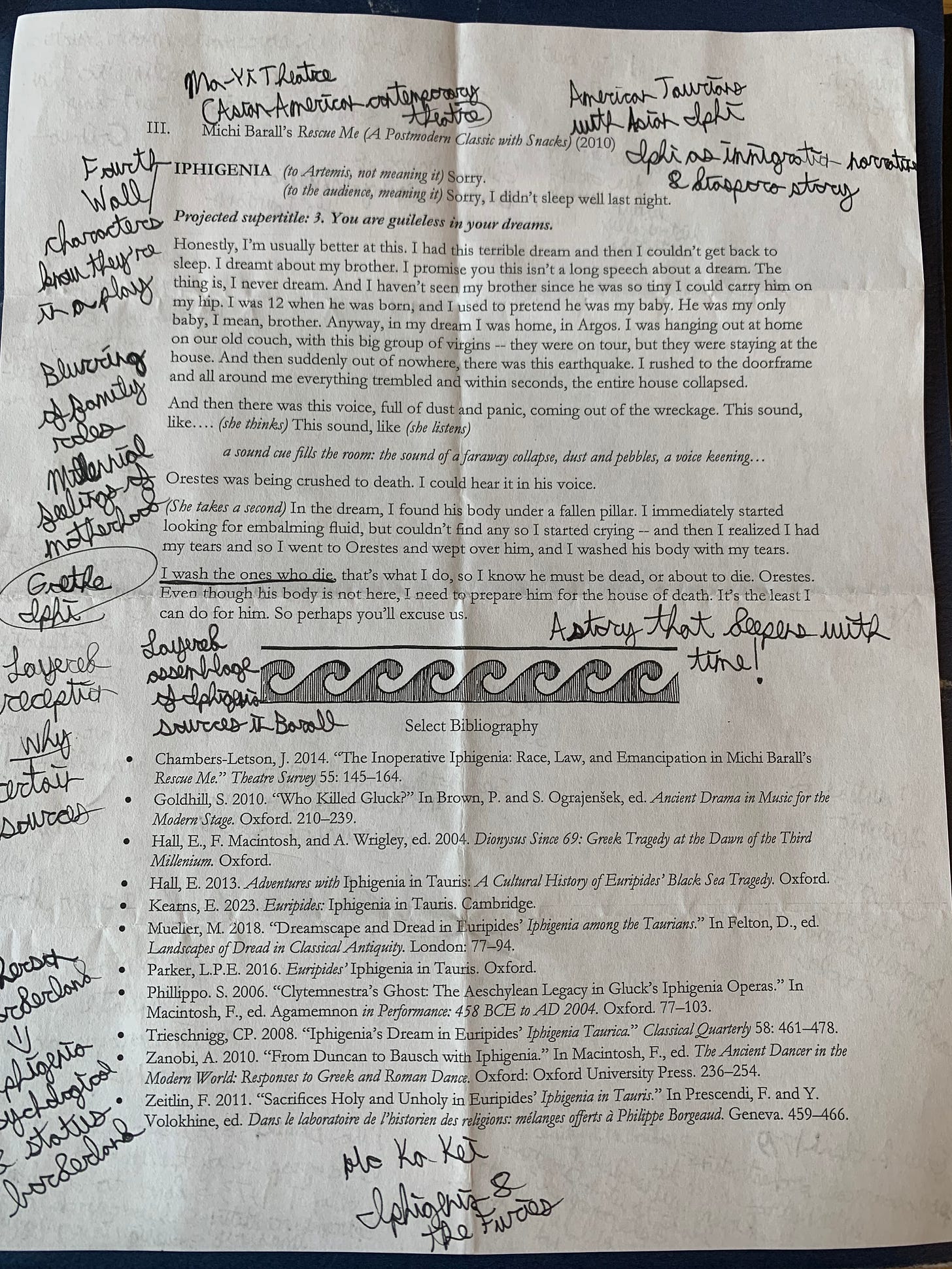Back in January, I teased that I had some conference appearances in the near future. Well, time’s flown as it always does, and that near future is now the near past. A few weeks ago, I visited the annual joint conference of the Classical Association of the Pacific Northwest (CAPN) and the Classical Association of the Canadian West (CACW).
Luckily for me, I didn’t have to travel far for this conference. It happened in my hometown, only a bus ride away at the University of British Columbia. This means I also got to enjoy a walk in the nearby Pacific Spirit urban forest before all the panels and presentations and socializing began!
A dear friend from out of town joined me for the conference, and we had a fantastic time roaming around in the woods, looking for cool fungi. This has precious little to do with Mediterranean antiquity: I just really love fungi.
On to the conference itself. I was delighted by the sheer volume of reception-themed papers presented: I was far from the only person there with an interest in modern treatment of the ancient world. Even the keynote speech was about reception!
In past experiences with groups of academics, I’ve sometimes felt like the odd one out. I usually spend time with historians, archaeologists, and their ilk: these are people who research the past directly. I’ve studied plenty of historical material, but my own work is on modern reception of history, not history itself. It’s a bit meta. At this conference, it was refreshing to speak to other scholars who look at antiquity the same way I do, filtered through the lens of later culture. (I’d make the argument that we all look at antiquity filtered through the lens of later culture, since we all come from later cultures, but that’s beside the point…) I generally feel at home among historians, but speaking to other reception scholars got me particularly excited. These are My People, My Crowd!
As well as being part of a group of reception scholars, I was far from the only younger person at the conference. Plenty of my fellow speakers and audience members were grad students, undergrads, and early career professionals. It was a treat to hang out with people at a similar stage of life to me: a cluster of us went for lunch together, and spent the entire time talking about modern interpretations of Greek tragedy, as well as swapping (strong!) opinions about the treatment of Greek myths in pop culture. Excellent stuff.
My talk was part of a panel on reception in gaming: a subject close to my heart. I presented my paper “Choose Your Own Aristeia: Simulations of Homeric God-Mortal Relations in Contemporary Tabletop Gaming.” My talk didn’t get recorded for posterity, but it grew out of the “Playing Gods” lecture I gave at SFU earlier this year. If you watched the section on games and mythology from that video, you’ll get a rough idea of my conference paper. This isn’t the end of the road for “Choose Your Own Aristeia:” if it gets recorded elsewhere, I promise I’ll share it with you!
An Update on my Research: A Mythological Lecture
Happy late winter/early spring, my magnificent readers! I have an exciting thesis update for you. A few weeks ago, I gave a talk with the Centre for Hellenic Studies at SFU, which is my current home university. It was all about how modern board games depict Greek mythology: in my opinion, fascinating stuff!
Next time I give a presentation, I’d like to deploy some accessibility tools I saw in action at this conference. Suh Young Choi’s talk on narrative parallels between the Iliad and Star Wars (what a theme!!!) featured live subtitles on her slides. Julia Perroni handed out large-print handouts for her fascinating presentation on Cassandra and mental trauma in the Oresteia. I have to confess that, while I’ve thought a lot about making my research accessible to a non-academic audience, I can do more for accessibility in the disability rights sense of the term.
Julia’s paper was one of several at this conference that addressed class, sexuality, gender, and other markers of difference within both ancient and receptive media. I’d like to give particular kudos to Liam Dulaney, my fellow speaker on the gaming receptions panel. He shared some exciting research about how Assassin’s Creed: Odyssey portrays ancient Greek queer masculinity. Jennifer Porter’s work on Roman mime theatre and working-class entertainment was another highlight of the weekend. It was especially fun to chat with her about how the Romans used theatre to satirize current events, and how we both want to see more of this pithy, down-to-earth side of their culture in modern reception.
I’m always delighted to have conversations like these: I think an intersectional approach is the way forward for ancient Mediterranean studies, as well as an engaging way to draw new voices and opinions into the field. I would have appreciated more discussion of race and ethnicity within classics at this specific conference. However, I didn’t go to every single panel, so some conversations might have happened without my notice. Perhaps the most thought-provoking intersectional presentation was the aforementioned keynote speech. Claire Catenaccio dealt with Euripides’ tragedy Iphigenia Among the Taurians, looking at how this play engages with ancient Greek ideas about others/barbarians and frontiers, and how modern receptions of the story expand upon these ideas. I enjoyed her generous definition of the word “modern:” one of the receptions she analyzed is an opera by CW Gluck from 1779. You know, 1779, just a little while ago! I need to explore this opera for a Reception Radio entry sometime…
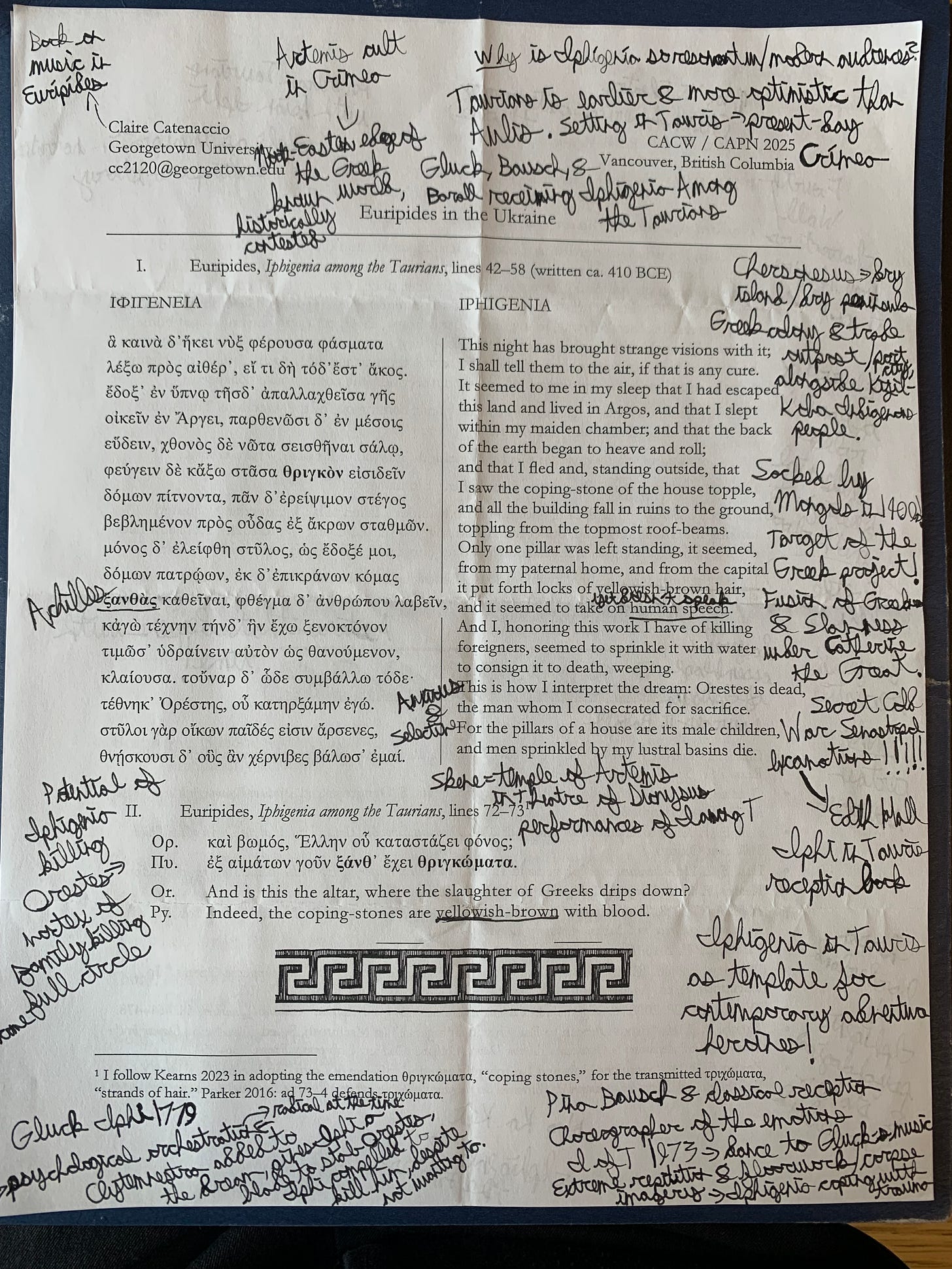
The keynote concluded with some sobering, yet very intriguing discussion about how the setting of Iphigenia Among the Taurians has evolved over the centuries. The land of the Taurians in Euripides is present-day Crimea, a land that’s prominent in the western public consciousness right now for unfortunate reasons. Crimea’s connections to Greek antiquity have heavily affected its later history, including the Russian empire’s desire to hold onto the peninsula. A lot of information about ancient Crimea is impossible to find from outside Russia, and Crimean dig sites are currently inaccessible because of the invasion of Ukraine. This is a difficult topic, but, after this conference, I badly want to explore it further.
Despite some occasionally heavy subject matter, the overall feel at this conference was friendly and welcoming. In fact, that’s generally been my experience socializing with classicists, at least at events like this one. We’re happy to talk about dark and troubling things, but we know how to balance it all out and include some levity once in a while. Everyone I spoke to was eager to chat, either to ask questions about my research or to share more details about their own findings. In addition to presenting, I got the chance to chair a panel for the first time. It was a lot easier than I expected (frankly, the speakers did most of the work!), and I would happily do it again.
Stay tuned for more of my academic adventures! I was going to go to Sacramento for a Hellenic Studies conference this April, but, because of all the awful things going on in the USA right now (including detaining Canadians at the border for no good reason…), I’ve chosen to cancel that trip. However, I have at least one more conference appearance coming up, safely within Canada. More on that soon!




